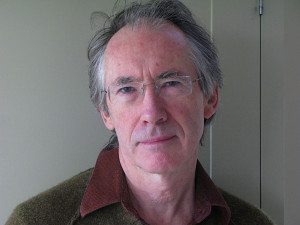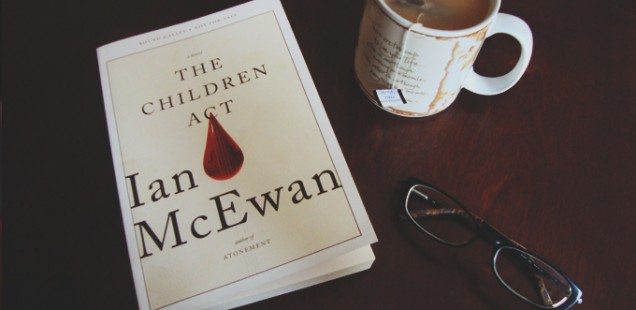The Children Act by Ian McEwan (review)
Ian McEwan, one of the most gifted novelists of our time, has recently vouched for the superiority of the novella over its lengthier form. He believes that few novels do enough to earn their length. My copy of his latest work, The Children Act, is 213 generously spaced pages, and so it is a wonder that he has managed to produce a nuanced exploration of a titanic theme: the conflict between the secular and the religious. It tells the story of Fiona Maye, a renowned High Court judge with domestic trouble at home, and a cancer-stricken Jehovah’s Witness called Adam Henry who has refused a blood transfusion on religious grounds. Fiona is the judge in charge of deciding which of these is most important: his long-term health, or his right to refuse treatment.
Fiona sees the case in stark terms:
“The court must choose, on behalf of the children, between total religion and something a little less. Between cultures, identities, states of mind, aspirations, sets of family relations, fundamental definitions, basic loyalties, unknowable futures.”
Her problems at home is the reason why this case above all has such a hold on her. Her husband, Jack, has just boldly asked for permission to have a nostalgic affair with a young lady called Melanie – “Ecstasy, almost blacking out with the thrill of it. Remember that? I want one last go, even if you don’t. Or perhaps you do”. Fiona is, unsurprisingly, not too keen on the idea, and the redirection of her husband’s attention and (he hopes) energy to a younger, more tireless woman can only make her own reluctant glances in the mirror all the more painful.
These reflections on maturity lead to a heightening of the emotion that pervades the novel: her childlessness.
This thought lingers, and impels her to make an uncharacteristic visit to the hospital of the young boy, Adam, to assess his predicament. This amusing, poetry-loving, violin-playing boy is also firmly convinced of the veracity of his own outlook, and it becomes clear that any simple-minded talk of parental indoctrination would be an insufficient explanation of his rejection of the transfusion. They develop an unusual friendship, propelled forwards by Adam’s desire for an authority figure, and by Fiona’s unconscious search for a surrogate son. But she is still the Judge in charge of the case, and her judgement swiftly leads to an unexpected series of events.
I myself attribute McEwan’s vitality to a preoccupation and engagement with the natural sciences. Previously, Solar had tackled climate change, and Saturday had drawn a convincing portrait of a neurosurgeon. But in The Children Act the science takes a backseat role – limited to leukaemia and the urgent need for a blood transfusion – and the judicial system is put in the dock. The fact that justice can only ever be carried out by fallible human beings is well captured after an unnecessary act of impulsiveness by Fiona herself elicits this response:
“A professional life spent above the affray, advising then judging, loftily commenting in private on the viciousness and absurdity of divorcing couples, and now she was down there with the rest, swimming with the desolate tide.”
 That this talk of tides contains a nod to Gatsby and his own doomed attempt at living above the affray, is not accidental. But ultimately, the novel appears to view the process of the legal system as imperfect but honourable, and it seems to me that through its repeated references to current events, as when Fiona is listening to the radio with “Suicide bombers in crowded public places in Pakistan and Iraq, shelling of apartment blocks in Syria, Islam’s war with itself conducted by means of twisted car frames and rubble,”, McEwan suggests that the common gut reaction to such headlines is unhelpful, and that the politically minded person would do well to emulate some of the Judge’s characteristics: an awareness of relevant historical precedents, and a willingness to lose sleep over her judgements. In fact, I think the ideal reader of McEwan’s later work (with its focus on moral ambiguity) is the instinctive liberal who is attempting to resolve the contradictions that arise when you try to please and accommodate everyone.
That this talk of tides contains a nod to Gatsby and his own doomed attempt at living above the affray, is not accidental. But ultimately, the novel appears to view the process of the legal system as imperfect but honourable, and it seems to me that through its repeated references to current events, as when Fiona is listening to the radio with “Suicide bombers in crowded public places in Pakistan and Iraq, shelling of apartment blocks in Syria, Islam’s war with itself conducted by means of twisted car frames and rubble,”, McEwan suggests that the common gut reaction to such headlines is unhelpful, and that the politically minded person would do well to emulate some of the Judge’s characteristics: an awareness of relevant historical precedents, and a willingness to lose sleep over her judgements. In fact, I think the ideal reader of McEwan’s later work (with its focus on moral ambiguity) is the instinctive liberal who is attempting to resolve the contradictions that arise when you try to please and accommodate everyone.
Toward the end of the novel it becomes apparent that we have been reading a daring retelling of what is perhaps the greatest short story in the English language, The Dead by James Joyce. Once this realisation sets in, the reader is compelled to notice the similarities: the keeping up of appearances at social occasions, the pitiful boy pining in the rain, and the epiphanic moment triggered by a haunting operatic score.
The masterful examination of sexual jealousy is evidence of a growing confidence at an age (McEwan is sixty-six) at which most writers have begun to be outdone by their earlier selves
The Children Act is therefore a welcome addition to a body of work that has attempted to investigate the conflict between the secular and the faithful. The novel fuses the traditional elements of narrative with the latest advances in our mastery of the natural world, and in embracing the emerging moral nuances that spring up as a result.
[divider]

Comments